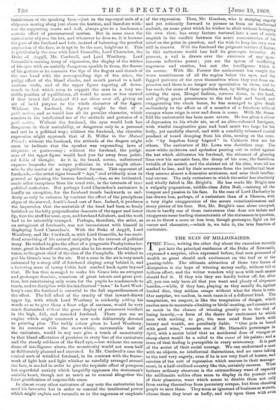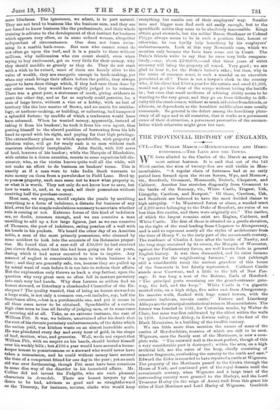THE RUIN OF MILLIONAIRES.
THE Times, writing the other day about the execution recently put into the principal residences of the Duke of Newcastle, expressed a surprise, often expressed before, that men possessed of wealth so great should seek excitement on -the turf or at the gaming-table. The ultimate attraction of those two forms of dissipation is the hope of winning money easily, without toil or tedious effort, and the writer wonders why men with such means should feel it. If they win they are hardly better off, for, after all, you can only have all that you want and plenty of sixpences besides,—while, if they lose, playing as they usually do, against loaded dice, they seldom escape without what for them is ruin. Our surprise, we confess, in such cases is of a different kind. The temptation, we suspect, is like the temptation of danger, which excites men to mountain-climbing or birds'-nesting, and consists not so much in the chance of winning greatly RS in the risk of losing heavily,—a form of the desire for excitement to which men with nothing to get, the men sated from birth with luxury and wealth, are peculiarly liable. "One gets so bored with good wine," remarks one of Mr. Diaraeli's personages in Sybil, with a secret belief that an accidental dose of vinegar or cheap claret would -be a relief to the ennui of his palate; and a trace of that feeling is perceptible in every aristocracy. It is part of the secret of their social courage. We can understand a man with no objects, no intellectual distractions, and no cares taking to the turf very eagerly, even if he is not very fond of horses, and careless of the sort of reputation which success in their management, in a half-civilized country like this, certainly ensures. What bothers ordinary observers is the extraordinary want of capacity the millionaire nobles often seem to display in the pursuit even of their pleasures, want which seems to disable them not only from saving themselves from pecuniary scrapes, but from choosing people to save them. They seem as ignorant of business as women, choose those they trust as badly, and rely upon them with mak more blindness. The ignorance, we admit, is in part natural. They are not bred to business like the business men, and they are not forced to know business like the professionals, and their whole training is adverse to the development of that instinct for business which appears very often, as in some refined women, altogether independent of circumstances. One does not learn swimming in a marble bath-room. But men who cannot count do not often go upon the turf, and it is a puzzle to those without millions, why millionaires who can count should, even when trying to buy excitement, get so very little for their money, why they should muddle so grossly as they do. They do not start with a wish to be ruined, most of them are keenly alive to the value of wealth, they are energetic enough in book-making, yet when any crash brings their affairs before the public, they always appear to have done things which, if they had seen them done by any other man, they would have rightly judged to be ruinous. There was a great peer, a statesman of mark, giving evidence in court the other day, and as far as anybody could perceive, he, a man of large brain, without a vice or a hobby, with no lust of territory like the late master of Stowe, and no mania for ornithology, or harbour-making, or building, or collecting, had hampered a splendid fortune by muddle of which a tradesman would have been ashamed. When he wanted money, apparently, instead of taking it from his bankers', he took it from his own agent, thus putting himself in the absurd position of borrowing from his left hand to spend with his right, and paying for that high privilege. The extraordinary places to which spendthrifts, with property of fabulous value, will go for ready cash is to men without such reeources absolutely inexplicable. John Smith, with 300 acres of land, borrows of his banker; while the Marquis of Blankshire, with estates in a dozen counties, resorts to some rapacious bill discounter, who, as the victim knows quite well all the while, will not make an effort to do business on bankers' terms. This is exactly as if a man were to take India Stock warrants to raise money on them from a pawnbroker in Field Lane. Bred up to poseess property, such men seem not to know what property is, or what it is worth. They not only do not know how to save, but how to waste it, and, so to speak, sell their possessions without receiving half the purchase-money.
Most men, we suppose, would explain the puzzle by ascribing everything to a form of indolence, a distaste for business of any kind, even for the simple calculations necessary to ascertain whether rain is coming or not. Extreme forms of this kind of indolence are, no doubt, common enough, and we can conceive a man "unwilling to add up a few large figures, just as we can conceive of Thomson, the poet of indolence, eating peaches off a wall with his hands in his pockets. We heard the other day of an Austrian noble, a man of the most princely possessions, who chanced by some accident to look into the accounts of his Bohemian properties. He found that of a rent-roll of /50,000 he had received just eleven florins, and that this had been going on for six years, during which it had never occurred to him to inquire. Any amount of neglect is conceivable in men to whom business is a bore ; and they are generally safe, too, because they are pulled up by actual want of cash before it is too late to redeem their affairs. But the explanation only throws us back a step farther, upon the question why very great men so often fall in matters pecuniary into such very bad hands. Why does Lauzuu so seldom find an honest steward, or Esterhazy a clearheaded Chancellor of the Ex-chequer? The quality wanted, that of being an honest steward on a large scale, is not only a common one,—it includes, say, half the Scotchmen alive,--but is a purchaseable one, and yet it seems in all these cases never to be obtained. Spendthrifts of a certain high class seem to lose all faculty of judging men, or in some cases of securing aid at all. Take, as an extreme instance, the case of William Pitt. It was, we believe, ascertained after his death that the root of his chronic pecuniary embarrassments, of the debts which the nation paid, was kitchen waste on an almost incredible scale. He was plundered every day and every hour of gold, in the shape -of beef, mutton, wine, and groceries. Well, we do not expect that William Pitt, with an empire on his hands, should bother himself -over his weekly bills; but £100 a year would have secured a housekeeper honest to penuriousness or a steward who would never have taken a commission, and he could without money have secured the time of a competent friend for one day in the year; yet no such aid was ever forthcoming, though Pitt must have been conscious in some dim way of the disorder in his household affairs. Mr. Colinas did not invent the Pedgifts, who are such pleasant characters in Armadale. There are honest lawyers by the dozen to be had, advisers as good and as straightforward as the Treasury, for instance, secures, clerks who would keep everything but results out of their employers' way. Smaller men and bigger men find such aid easily enough, but to the spendthrift nobles they seem to be absolutely inaccessible. Kings obtain good stewards, but the nobles' Baron Stockinar or Colonel Phipps always seems to be in such a position that, honest or otherwise, he can hardly help benefiting by his employers' embarrassments. Look at this very Newcastle case, which we mention only because the facts have come out in Court. The Duke's friends write to say that he owes very little comparatively,—say, about /200,000,—and that three years of strict eecnomy will bring the property all round. Very good ; we are glad to hear it, for the Duke's father's sake ; but then, why in the name of common sense, is such a scandal as an execution permitted at all? There is not a lawyer's clerk in the country who, if his client had /500 a year for life certain and owed 1.1,500, would not get him clear of the serape without letting the bailiffs in ; but even that small modicum of advising ability seems to be wanting to the very great, and they go on from difficulty to difficulty till the crash comes, without as much aid either from friends, or aavisers, or dependents as the humblest middle-clasa man usually commands. So general is the defect among the hereditary plutocracy of all ages and in all countries, that it works as a permanent cause of their destruction, a permanent preventive of the accumulation which otherwise might grow too vast.































 Previous page
Previous page